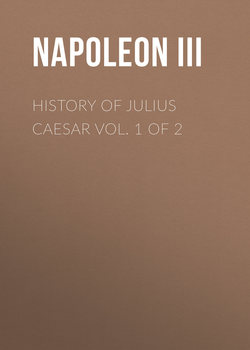History of Julius Caesar Vol. 1 of 2

Реклама. ООО «ЛитРес», ИНН: 7719571260.
Оглавление
Napoleon III. History of Julius Caesar Vol. 1 of 2
PREFACE
BOOK I. ROMAN HISTORY BEFORE CÆSAR
CHAPTER I. ROME UNDER THE KINGS
CHAPTER II. ESTABLISHMENT OF THE CONSULAR REPUBLIC
CHAPTER III. CONQUEST OF ITALY
CHAPTER IV. PROSPERITY OF THE BASIN OF THE MEDITERRANEAN BEFORE THE PUNIC WARS
CHAPTER V. PUNIC WARS AND WARS OF MACEDONIA AND ASIA
CHAPTER VI. THE GRACCHI, MARIUS, AND SYLLA
BOOK II. HISTORY OF JULIUS CÆSAR
CHAPTER I
CHAPTER II
CHAPTER III
CHAPTER IV
CHAPTER V. CONSULSHIP OF CÆSAR AND BIBULUS
Отрывок из книги
I. “In the birth of societies,” says Montesquieu, “it is the chiefs of the republics who form the institution, and in the sequel it is the institution which forms the chiefs of the republics.” And he adds, “One of the causes of the prosperity of Rome was the fact that its kings were all great men. We find nowhere else in history an uninterrupted series of such statesmen and such military commanders.”8
The story, more or less fabulous, of the foundation of Rome does not come within the limits of our design; and with no intention of clearing up whatever degree of fiction these earliest ages of history may contain, we purpose only to remind our readers that the kings laid the foundations of those institutions to which Rome owed her greatness, and so many extraordinary men who astonished the world by their virtues and exploits.
.....
The isolation of the Latin colonies, placed in the middle of the enemy’s territory, obliged them to remain faithful to Rome, and to keep watch on the neighbouring peoples. Their military importance was at least equal to that of the Roman colonies; they merited as well as these latter the name of propugnacula imperii and of specula,181 that is, bulwarks and watch-towers of the conquest. In a political point of view they rendered services of a similar kind. If the Roman colonies announced to the conquered people the majesty of the Roman name, their Latin sisters gave an ever-increasing extension to the nomen Latinum,182 that is, to the language, manners, and whole civilisation of that race of which Rome was but the first representative. The Latin colonies were ordinarily founded to economise the colonies of Roman citizens, which were charged principally with the defence of the coasts and the maintenance of commercial relations with foreign people.
In making the privileges of the Roman citizen an advantage which every one was happy and proud to acquire, the Senate held out a bait to all ambitions; and this general desire, not to destroy the privilege, but to gain a place among the privileged, is a characteristic trait of the manners of antiquity. In the city not less than in the State, the insurgents or discontented did not seek, as in our modern societies, to overthrow, but to attain to. So every one, according to his position, aspired to a legitimate object: the plebeians to enter into the aristocracy, not to destroy it; the Italic peoples, to have a part in the sovereignty of Rome, not to contest it; the Roman provinces to be declared allies and friends of Rome, and not to recover their independence.
.....